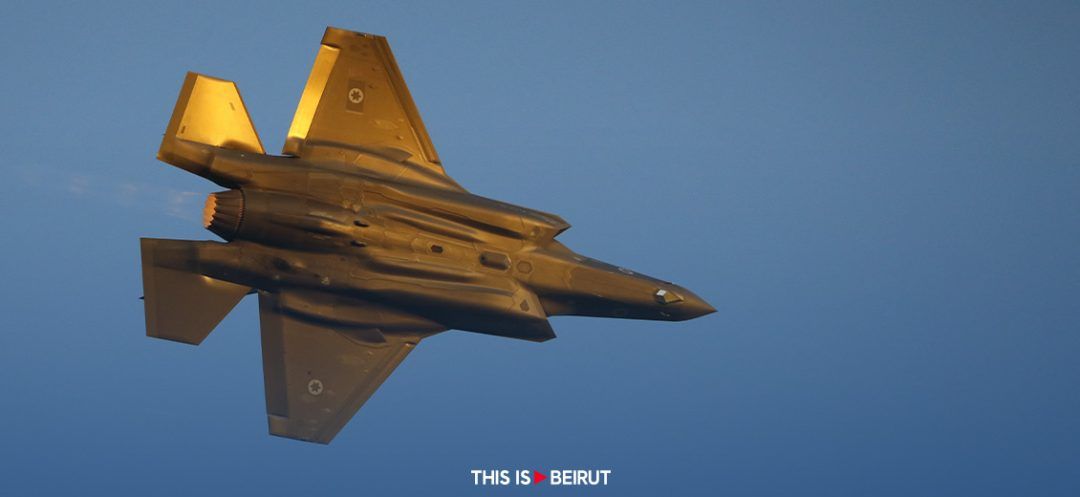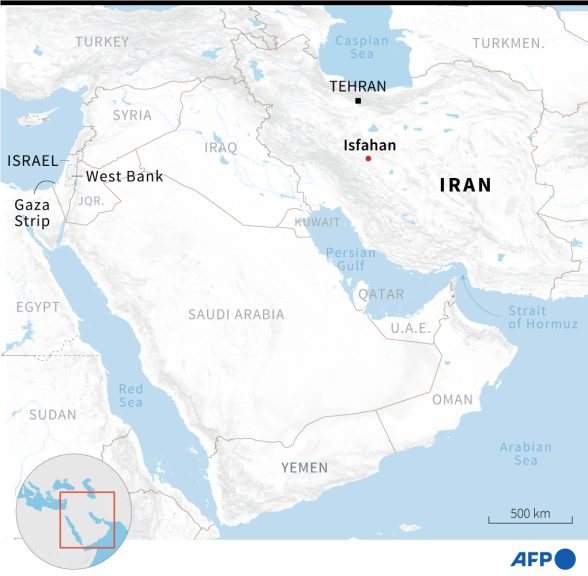- Home
- War in the Middle East
- Israel Strikes at the Heart of Iran

©(Jack GUEZ / AFP)
Iran's state media reported explosions in the central province of Isfahan Friday, as US media quoted officials saying Israel had carried out retaliatory strikes on its arch-rival.
Air defense systems over several Iranian cities were activated, state media reported, after the country's official broadcaster said explosions were heard near the city of Isfahan.
 Israel had previously warned it would hit back after Iran fired hundreds of missiles and drones at Israel over the weekend. Most of them were intercepted.
Israel had previously warned it would hit back after Iran fired hundreds of missiles and drones at Israel over the weekend. Most of them were intercepted.
Iran's Fars news agency reported "three explosions" were heard near Qahjavarestan, near Isfahan airport and the Shekari army airbase, while Iran's space agency spokesman Hossein Dalirian said "several" drones had been "successfully shot down".
Dalirian said on social media platform X there were "no reports of a missile attack".
"Reports indicate there was no major damage or large explosions caused by the impact of any air threat," the official IRNA news agency said.
Nuclear facilities in Isfahan were reported to be "completely secure", Iran's Tasnim news agency said.
ABC and CBS News reported the strikes had been carried out by Israel, quoting US officials. There was no immediate comment from the White House or Pentagon.
CNN quoted an official as saying the target of the Israeli attack was not nuclear.
The Israeli military told AFP: "We don't have a comment at this time."
The United States received advance notice of Israel's reported strike on Iran but did not endorse the operation or play any part in its execution, US media quoted officials as saying.
NBC and CNN, citing sources familiar with the matter and a US official, respectively, said Israel had provided Washington with pre-notification of the strike.
Various networks cited officials confirming a strike had taken place inside Iran, with CNN quoting one official as stating the target was not a nuclear facility.
Israel told the United States on Thursday it would be retaliating against Iran in the coming days, a senior US official told CNN.
"We didn't endorse the response," the official said, according to CNN.
There was no immediate comment from the White House about the Israeli strike.
In response to a query from AFP, the Pentagon duty desk said: "We do not have anything to offer at this time."
Over the weekend, Iran carried out its first attack to directly target regional foe Israel.
Israel, backed by its allies, intercepted most of the 300 missiles and drones launched by Iran, and suffered no deaths.
It launched its attack in retaliation for an April 1 strike on its consulate in the Syrian capital Damascus, that was widely blamed on Israel. In that attack, seven of Iran's Revolutionary Guards including two generals were killed.
Iran-backed groups have bolstered President Bashar al-Assad's forces since the start of Syria's civil war in 2011.
The explosions in Iran coincided with the 85th birthday of Iran's supreme leader Ayatollah Ali Khamenei.
Flights were suspended across swathes of Iran on Friday, with the UAE-based flydubai airline cancelling flights to the country.
"Iran's air defence has been activated in the skies of several provinces of the country," IRNA said.
Mehr news agency reported that "flights to Tehran, Isfahan and Shiraz, and airports in the west, northwest and southwest have been suspended."
Flight-tracking software showed commercial flights avoiding western Iran, including Isfahan, and skirting Tehran to the north and east.
Blasts were also reported in southern Syria, according to a local activist group.
"There were strikes on a Syrian army radar position," said Rayan Maarouf, who runs the Suwayda24 anti-government website that covers news from Sweida province in the south.
On Thursday, UN Secretary-General Antonio Guterres painted a dark picture of the situation in the Middle East, warning that spiralling tensions over the war in Gaza and Iran's attack on Israel could devolve into a "full-scale regional conflict."
"The Middle East is on a precipice. Recent days have seen a perilous escalation -- in words and deeds," Guterres told the Security Council.
"One miscalculation, one miscommunication, one mistake, could lead to the unthinkable --- a full-scale regional conflict that would be devastating for all involved," he said, calling on all parties to exercise "maximum restraint."
With AFP
Air defense systems over several Iranian cities were activated, state media reported, after the country's official broadcaster said explosions were heard near the city of Isfahan.
 Israel had previously warned it would hit back after Iran fired hundreds of missiles and drones at Israel over the weekend. Most of them were intercepted.
Israel had previously warned it would hit back after Iran fired hundreds of missiles and drones at Israel over the weekend. Most of them were intercepted.Iran's Fars news agency reported "three explosions" were heard near Qahjavarestan, near Isfahan airport and the Shekari army airbase, while Iran's space agency spokesman Hossein Dalirian said "several" drones had been "successfully shot down".
Dalirian said on social media platform X there were "no reports of a missile attack".
"Reports indicate there was no major damage or large explosions caused by the impact of any air threat," the official IRNA news agency said.
Nuclear facilities in Isfahan were reported to be "completely secure", Iran's Tasnim news agency said.
ABC and CBS News reported the strikes had been carried out by Israel, quoting US officials. There was no immediate comment from the White House or Pentagon.
CNN quoted an official as saying the target of the Israeli attack was not nuclear.
The Israeli military told AFP: "We don't have a comment at this time."
US warned Iran in advance
The United States received advance notice of Israel's reported strike on Iran but did not endorse the operation or play any part in its execution, US media quoted officials as saying.
NBC and CNN, citing sources familiar with the matter and a US official, respectively, said Israel had provided Washington with pre-notification of the strike.
Various networks cited officials confirming a strike had taken place inside Iran, with CNN quoting one official as stating the target was not a nuclear facility.
Israel told the United States on Thursday it would be retaliating against Iran in the coming days, a senior US official told CNN.
"We didn't endorse the response," the official said, according to CNN.
There was no immediate comment from the White House about the Israeli strike.
In response to a query from AFP, the Pentagon duty desk said: "We do not have anything to offer at this time."
Flights suspended
Over the weekend, Iran carried out its first attack to directly target regional foe Israel.
Israel, backed by its allies, intercepted most of the 300 missiles and drones launched by Iran, and suffered no deaths.
It launched its attack in retaliation for an April 1 strike on its consulate in the Syrian capital Damascus, that was widely blamed on Israel. In that attack, seven of Iran's Revolutionary Guards including two generals were killed.
Iran-backed groups have bolstered President Bashar al-Assad's forces since the start of Syria's civil war in 2011.
The explosions in Iran coincided with the 85th birthday of Iran's supreme leader Ayatollah Ali Khamenei.
Flights were suspended across swathes of Iran on Friday, with the UAE-based flydubai airline cancelling flights to the country.
"Iran's air defence has been activated in the skies of several provinces of the country," IRNA said.
Mehr news agency reported that "flights to Tehran, Isfahan and Shiraz, and airports in the west, northwest and southwest have been suspended."
Flight-tracking software showed commercial flights avoiding western Iran, including Isfahan, and skirting Tehran to the north and east.
Mideast 'on a precipice'
Blasts were also reported in southern Syria, according to a local activist group.
"There were strikes on a Syrian army radar position," said Rayan Maarouf, who runs the Suwayda24 anti-government website that covers news from Sweida province in the south.
On Thursday, UN Secretary-General Antonio Guterres painted a dark picture of the situation in the Middle East, warning that spiralling tensions over the war in Gaza and Iran's attack on Israel could devolve into a "full-scale regional conflict."
"The Middle East is on a precipice. Recent days have seen a perilous escalation -- in words and deeds," Guterres told the Security Council.
"One miscalculation, one miscommunication, one mistake, could lead to the unthinkable --- a full-scale regional conflict that would be devastating for all involved," he said, calling on all parties to exercise "maximum restraint."
With AFP
Read more



Comments